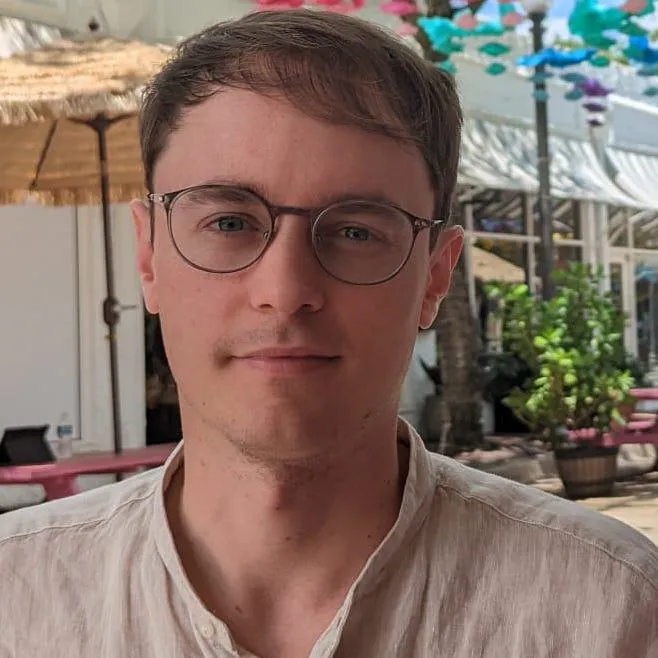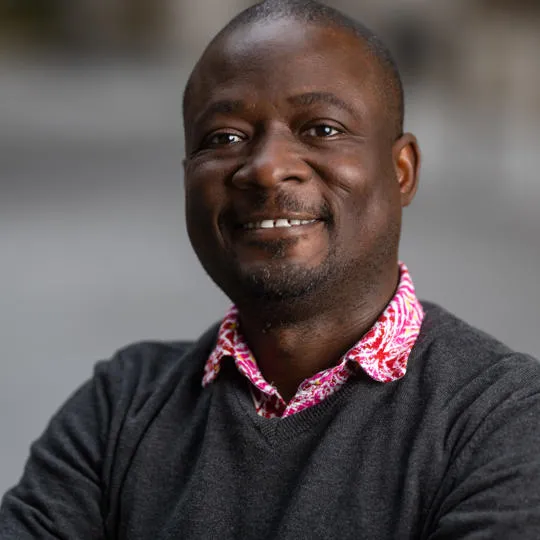UKRI’s Future Leaders Fellowships offer long-term support to outstanding researchers, helping them turn bold ideas into innovations that improve lives and livelihoods in the UK and beyond. These fellowships continue to drive excellence and accelerate the journey from discovery to public benefit. I wish them every success.
UKRI Chief Executive, Professor Sir Ian Chapman
16 September 2025
King's researchers receive coveted Future Leaders Fellowship
UK Research and Innovation (UKRI) has today announced the latest recipients of its prestigious Future Leaders Fellowship, including three researchers from King’s.

Dr Timothy Neate (Faculty of Natural, Mathematical and Engineering Sciences) Dr Sarah Morgan (Faculty of Life Sciences and Medicine), and Dr Clement Sefa-Nyarko (Faculty of Social Science and Public Policy) are among 77 academics chosen to share in £120 million of UKRI investment and to lead vital research, collaborate with innovators and develop their careers as the research and innovation leaders of the future.
The Future Leaders Fellowship scheme provides long-term (up to seven years) of Fellowship support to early career researchers to enable them to tackle ambitious programmes or multidisciplinary questions, and new or emerging research and innovation areas and partnerships.

Dr Timothy Neate, Senior Lecturer in Computer Science in the Department of Informatics
One in five people in the UK will experience communication disabilities at one point in their lives, whether that be difficulty speaking after a stroke, having trouble communicating after a dementia diagnosis, dyslexia in the classroom, or any number of conditions.
While those with complex communication needs stemming from these disabilities are more likely to have an increased risk of depression, psychological stress and poor quality of life, over 60% of current assistive technology is thrown away in a year. These voice-based systems, like Stephen Hawking’s voice communication apparatus, are discarded because of the stigma associated with them and their inability to express non-verbal forms of communication, such as tone of voice, gestures and body language.
By utilising AI models that that can help identify and react to the context of conversations between individuals, both online and in-person, Dr Neate aims to create a range of wearable technologies to help aid those with communication difficulties communicate functionally and with confidence.
Deploying devices like smartphones, smartwatches and augmented reality headsets, Dr Neate’s software will identify context, such as if the other person in the conversation is a close friend or in a work context, and generate useful phrases that can serve as conversation aids in those specific scenarios.
Dr Neate said: “You would be surprised how well someone who might speak three or four words can communicate. Through gestures, body language and tone of voice people can get their message across effectively. By creating technology that embraces total communication instead of just the verbal communication of traditional devices, we can empower people to communicate confidently and functionally every day, improving their quality of life.”
To complete his work, Dr Neate will be working with key partners across the charity, technology and academic sectors, including Microsoft Research, Aphasia Re-Connect, Hidden Disabilities, Tobii Dynavox, TfL and City St George’s University of London. He will also be taking an active policy role in the field of assistive technology.

Dr Sarah Morgan, Senior Lecturer in Healthcare Engineering
Predicting individual trajectories for patients with psychotic illnesses is both a clinical and patient priority. These conditions typically emerge in early adulthood and involve distressing symptoms such as hallucinations and delusions. Approximately a quarter of patients develop schizophrenia or other long-term, severe illnesses, whilst others make a good recovery. However, there are currently no reliable ways to predict how an individual’s illness will develop or to identify who is most at risk of relapse. Tools that could provide such insights would transform care, giving patients and clinicians valuable time to act before symptoms worsen.
Dr Morgan’s research tackles this challenge by harnessing the power of AI. Because changes in brain connectivity and alterations in speech are central features of psychotic illnesses, these offer especially promising sources of data for AI to learn from. Dr Morgan has already led pioneering work in this area, developing new methods to measure brain connectivity with greater reliability and to analyse the content of patients’ speech in finer detail.
Building on this foundation, Dr Morgan’s Future Leaders Fellowship will create innovative AI tools capable of predicting how patients’ symptoms are likely to evolve over time and anticipating relapse in those tapering off medication. Equally important is ensuring the tools are trustworthy and meet the needs of patients and clinicians, a goal Dr Morgan is pursuing in collaboration with clinicians, AI specialists and people with lived experience of psychosis. Ultimately, this work could help reshape the way psychotic illnesses are managed, enabling earlier, more personalised treatments and empowering patients to monitor their own recovery.
Dr Morgan said: “I’m absolutely delighted to be awarded a Future Leaders Fellowship, to develop AI tools to predict illness progression and relapse in psychosis. By combining advanced AI with close stakeholder engagement, I aim to make a real difference to how these severe conditions are monitored and treated.”

Dr Clement Sefa-Nyarko, Lecturer in Security, Development and Leadership in Africa
With more than a decade’s experience in designing, managing and leading several projects in Africa and the Asia Pacific, Dr Sefa-Nyarko’s area of expertise lies in natural resource governance, political theories of the state, social protection, security, and leadership.
He will use his Future Leaders Fellowship to analyse how people understand and experience justice during the shift to cleaner energy. The research will incorporate a new method that listens to both what people say and what they don’t – through stories, symbols, and silence.
By focusing on communities affected by mining in places like Chile, Ghana, and Australia, the project’s aim is to make sure these communities’ voices are heard in decisions about climate and development, helping create fairer policies for the future.
Dr Sefa-Nyarko said: “I welcome this extraordinary opportunity to contribute to the new, rapidly emerging, often evoked and yet largely evasive concept of ‘justice’ in critical minerals governance and the transitions to net zero. It presents both an opportunity and a challenge, both of which I embrace, and see King’s and all my partners in Australia, Chile and Ghana as very well placed to support this endeavour to achieve the three-tier objectives of epistemic consensus, global policy relevance, and mining community satisfaction.”
UKRI’s Future Leaders Fellowships provide researchers and innovators with long-term support and training to embark on large and complex research programmes, to address key national and global challenges. The programme supports the research and innovation leaders of the future to transcend disciplinary and sector boundaries, bridging the gap between academia and business. The fellows announced today demonstrate how UKRI supports excellence across the entire breadth of its remit, supporting early-career researchers to lessen the distance from discovery to real world impact.
Frances Burstow, Director of Talent and Skills at UKRI
For more information about the latest round of UKRI Future Leaders Fellowships click here.



